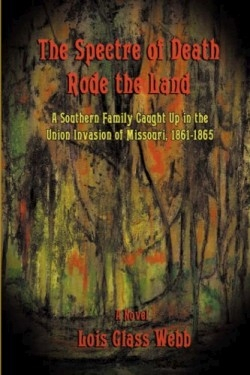
The Spectre of Death Rode the Land
A Southern Family Caught Up in the Union Invasion of Missouri, 1861-1865
When we read about life in places such as Baghdad or Gaza most of us cannot imagine a life under occupation. Lois Glass Webb’s second novel The Spectre of Death Rode the Land: A Southern Family Caught Up in the Union Invasion of Missouri 1861-1865 points out that living in a no-man’s-land is not as foreign a concept as it first appears. During the Civil War Union invaders declared martial law in Missouri. The state fractured into three groups: Northern sympathizers Confederates and partisans (defenders of a free Missouri).
Inspired by stories of her forefathers’ experiences in war-torn Ripley County Webb fictionalizes the Civil War as a conflict among members of the extended Gordon clan. The men must choose to support the Union Rebel or partisan sides while the women must choose to whom to give their love. Meanwhile poverty grinds them down; roving militias worry them and tensions explode in resistance and massacre.
Webb who goes beyond family lore to consult with professors historians and Civil War experts grounds The Spectre’s every dramatic event in solid research. She even gives details about the characters’ checked shirts and the acorn coffee they drink. Through her skillful use of actual events Webb surrounds the reader with a true sense of the war era.
For example in this passage Riley Gordon thinks about his brother who has just left the farm for the Confederate Army: “At intervals the dim moonlit picture of Stuart disappearing into the black forest popped his [Riley’s] eyes open. It could be the last picture he’d ever have of him. And he thought of how they had both betrayed their father riding out…to ‘play’ soldier with Adam Frazier’s partisans. Riley could still see Stuart’s moonlit form…with cutting pliers clutched in strong hands to nip a Union telegraph line and taste the joy of doing something toward protecting the homeland…” Because of her serious research and sensitive writing Webb makes believable characters.
The people in The Spectre engage a reader’s attention but the lack of a central plot leaves the book flagging. It is true that a conflict—the Civil War—frames the novel forcing the cast to make difficult choices. However the Gordon family’s trials seem like a series of tragedies without denouement or resolution. Without major culminations The Spectre reads like a day-to-day record. It runs handily on its descriptive power but even the best prose needs a strong narrative hook to pull the reader through 472 pages.
Though episodic The Spectre is an interesting depiction of a little-documented period in U.S. history. Appropriate for readers 13 and older The Spectre brings the past alive for history buffs Civil War enthusiasts and those interested in the Confederacy.
Reviewed by
Elizabeth Allen
Disclosure: This article is not an endorsement, but a review. The publisher of this book provided free copies of the book and paid a small fee to have their book reviewed by a professional reviewer. Foreword Reviews and Clarion Reviews make no guarantee that the publisher will receive a positive review. Foreword Magazine, Inc. is disclosing this in accordance with the Federal Trade Commission’s 16 CFR, Part 255.
